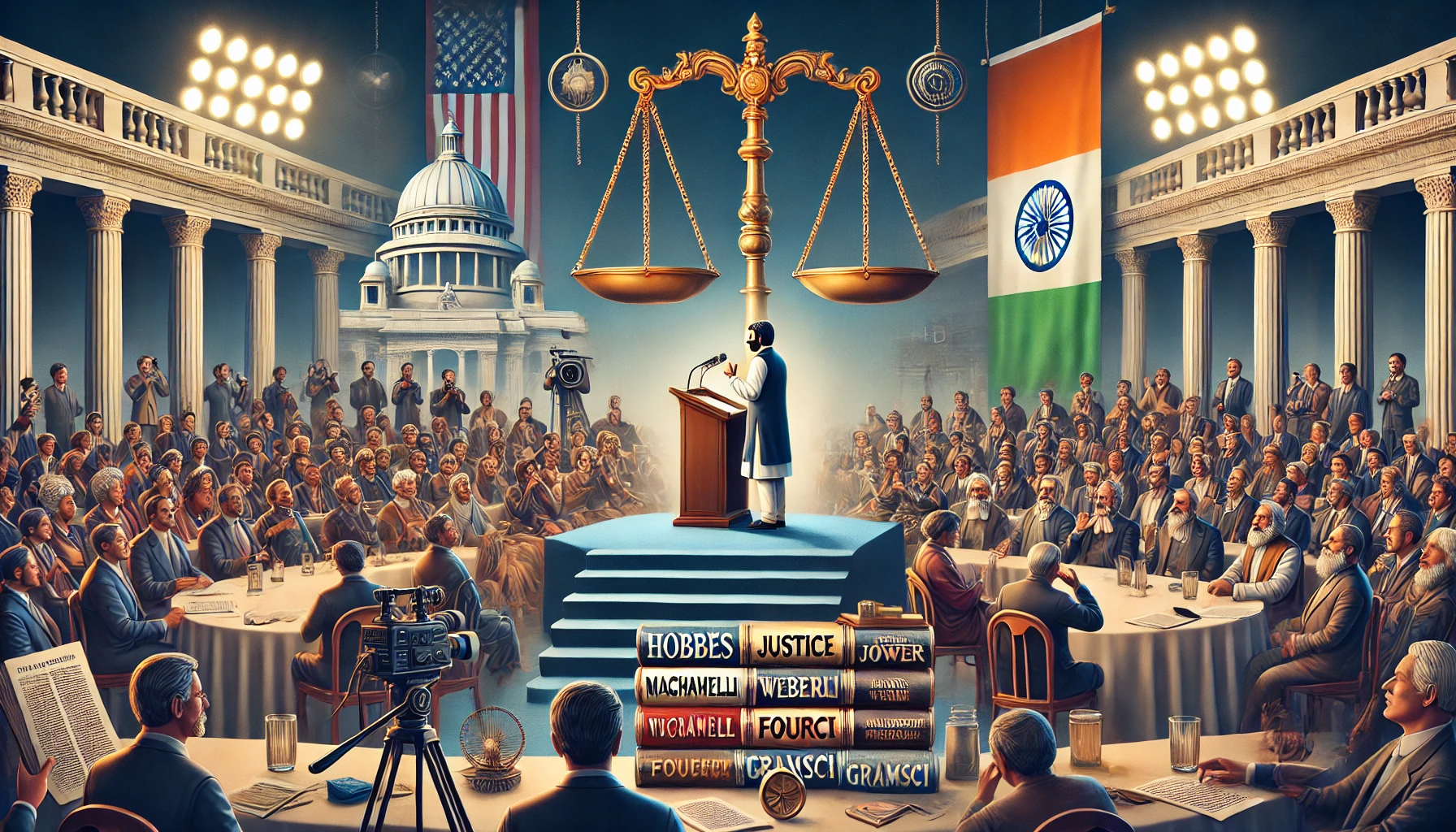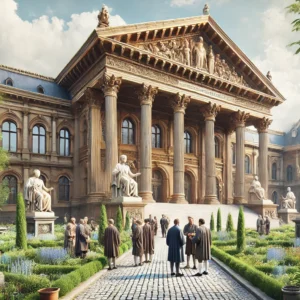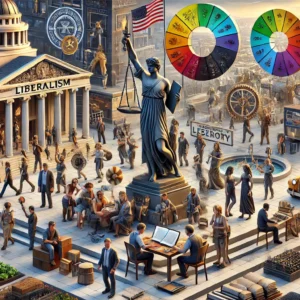The concept of politics as power offers a fundamental perspective on how societies are organized and governed. Power is an intrinsic element of all political systems, and understanding its distribution and exercise is crucial for comprehending the dynamics of political relationships and decision-making processes. This blog delves into the intricate dynamics of power in politics, exploring its historical context, theoretical foundations, practical implications, and contemporary relevance.
Introduction
Politics as power is an interpretation that emphasizes the role of power dynamics in shaping societal relationships, influencing decisions, and determining outcomes. This perspective focuses on how power is distributed and exercised within a society, examining the mechanisms through which individuals and groups exert influence over others. By exploring the various dimensions of power, we can gain a deeper understanding of political processes and the factors that drive social change.
Defining Politics as Power
Politics as power can be defined as the study of how power is acquired, maintained, and utilized within a society. This perspective examines the relationships between different actors, the structures that support power dynamics, and the impact of power on political and social outcomes.
The Nature of Power
Power is the ability to influence or control the behavior of others. It can be exercised through various means, including coercion, persuasion, and authority. Power is often associated with the capacity to achieve desired outcomes, shape decisions, and affect change.
Sources of Power
Power can originate from different sources, including wealth, knowledge, social status, and institutional authority. These sources provide individuals and groups with the means to exert influence and control over others.
Types of Power
Power can be categorized into different types, each with distinct characteristics and implications. Common types of power include coercive power, legitimate power, expert power, referent power, and reward power.
Historical Context of Politics as Power
The concept of politics as power has deep historical roots, with various political systems and thinkers emphasizing the role of power in shaping societies.
Ancient Civilizations
In ancient civilizations, power was often concentrated in the hands of rulers and elites. Kings, emperors, and pharaohs wielded immense power over their subjects, using military might, religious authority, and economic control to maintain their dominance.
Feudalism and Monarchy
During the medieval period, feudalism and monarchy were the dominant political systems in Europe. Power was distributed hierarchically, with monarchs and nobles holding significant control over land and resources. The feudal system emphasized loyalty and vassalage, with power relationships defining the social and political order.
Enlightenment and Revolutions
The Enlightenment era brought new ideas about power and governance. Philosophers such as John Locke and Montesquieu challenged the concentration of power in the hands of monarchs and advocated for the separation of powers and the protection of individual rights. The American and French Revolutions were pivotal moments that sought to redistribute power and establish more democratic forms of governance.
Modern Democracies
In modern democracies, power is more widely distributed through mechanisms such as elections, checks and balances, and the rule of law. While power dynamics still exist, democratic institutions aim to prevent the concentration of power and promote accountability and transparency.
Key Components of Politics as Power
To understand politics as power, it is essential to examine its key components: the acquisition of power, the exercise of power, and the impact of power on political and social outcomes.
Acquisition of Power
The acquisition of power involves the processes and strategies through which individuals and groups gain influence and control within a society.
- Elections and Political Campaigns: In democratic systems, elections are a primary mechanism for acquiring power. Political campaigns involve efforts to persuade voters and gain support for candidates and parties.
- Revolutions and Coups: In some contexts, power is acquired through revolutions and coups. These events involve the overthrow of existing authorities and the establishment of new political orders.
- Economic Influence: Wealth and economic resources can be significant sources of power. Individuals and groups with economic influence can shape political decisions and policies.
- Social Movements: Social movements mobilize individuals and communities to demand change and challenge existing power structures. They can lead to the acquisition of power by marginalized groups.
- Exercise of Power
The exercise of power involves the methods and practices through which individuals and groups exert influence and control over others.
- Coercion and Force: Coercive power involves the use of force or threats to achieve compliance. It is often associated with military and police actions.
- Persuasion and Propaganda: Persuasive power involves influencing others through communication and rhetoric. Propaganda is a tool used to shape public opinion and garner support for specific agendas.
- Legitimate Authority: Legitimate power is derived from formal positions and institutions. It involves the exercise of power within the framework of established laws and norms.
- Expertise and Knowledge: Expert power is based on specialized knowledge and skills. Individuals with expertise in particular areas can exert significant influence over decisions and policies.
Impact of Power
The impact of power on political and social outcomes is a critical aspect of politics as power. Power dynamics shape relationships, influence decisions, and determine the distribution of resources and opportunities.
- Policy and Legislation: Power influences the creation and implementation of policies and laws. Those in power can shape legislative agendas and prioritize specific issues.
- Social Inequality: Power dynamics contribute to social inequality by determining who has access to resources and opportunities. Marginalized groups often face barriers to acquiring and exercising power.
- Conflict and Cooperation: Power can lead to both conflict and cooperation. While power struggles can result in conflict and violence, power-sharing arrangements can facilitate cooperation and stability.
- Change and Continuity: Power dynamics drive social and political change. Shifts in power can lead to significant transformations in society, while entrenched power structures can maintain the status quo.
Philosophical Perspectives on Politics as Power
Several philosophers and theorists have contributed to the understanding of politics as power, offering valuable insights into its nature and implications.
Thomas Hobbes
Thomas Hobbes’s work “Leviathan” explores the concept of power and its role in the establishment of political order. Hobbes argued that in the state of nature, individuals are in constant conflict, and a powerful sovereign is necessary to maintain peace and security.
Niccolò Machiavelli
Niccolò Machiavelli’s “The Prince” provides a pragmatic analysis of power and political leadership. Machiavelli emphasized the importance of cunning, strategy, and pragmatism in acquiring and maintaining power.
Max Weber
Max Weber distinguished between different types of authority and power. In “Economy and Society,” Weber identified traditional, charismatic, and legal-rational authority as sources of legitimate power. He also explored the role of bureaucracy in the exercise of power.
Michel Foucault
Michel Foucault’s work on power and knowledge examines how power is embedded in social institutions and practices. Foucault argued that power is not just top-down but is pervasive and operates through various mechanisms of control and surveillance.
Antonio Gramsci
Antonio Gramsci’s concept of cultural hegemony explores how dominant groups maintain power by shaping cultural and ideological norms. Gramsci argued that power is exercised not just through coercion but through the consent of the governed.
Hannah Arendt
Hannah Arendt’s work on power emphasizes the distinction between power and violence. In “On Violence,” Arendt argued that power is rooted in collective action and cooperation, while violence is a tool used when power is absent.
The Role of Institutions in Politics as Power
Institutions play a critical role in the distribution and exercise of power. They provide the framework within which power dynamics operate and shape the behavior of political actors.
Legislative Institutions
Legislative institutions, such as parliaments and congresses, are central to the exercise of political power. They create laws, allocate resources, and provide a forum for debate and decision-making.
- Law-Making: Legislative bodies are responsible for creating and passing laws. This process involves negotiation and compromise among representatives with different interests.
- Budgeting and Resource Allocation: Legislatures control the allocation of public resources through budgeting processes. Power dynamics influence which projects and programs receive funding.
- Oversight and Accountability: Legislative bodies provide oversight of the executive branch, ensuring that government actions are transparent and accountable.
Executive Institutions
Executive institutions, including the presidency and government ministries, are responsible for implementing laws and policies. They play a key role in the exercise of administrative and executive power.
- Policy Implementation: The executive branch is tasked with implementing and enforcing laws. It has the authority to create regulations and manage government operations.
- Executive Orders and Decrees: Executives can issue orders and decrees to achieve specific policy goals. These actions often reflect the priorities and agendas of those in power.
- International Relations: Executive institutions manage foreign relations and represent the state in international affairs. Power dynamics influence diplomatic negotiations and agreements.
Judicial Institutions
Judicial institutions interpret and enforce laws, providing a check on the exercise of power by other branches of government. They ensure that power is exercised within the bounds of legality and justice.
- Judicial Review: Courts have the authority to review the constitutionality of laws and executive actions. Judicial review acts as a safeguard against abuses of power.
- Adjudication of Disputes: Judicial institutions resolve disputes and enforce legal rights. They provide a forum for individuals and groups to challenge the exercise of power.
- Protection of Rights: Courts play a critical role in protecting individual rights and freedoms. They ensure that government actions comply with constitutional and legal standards.
Contemporary Issues in Politics as Power
Understanding politics as power is essential for addressing contemporary social and political challenges. Several key issues highlight the importance of this perspective.
Political Corruption
Political corruption undermines the integrity of political systems and erodes public trust. It involves the abuse of power for personal gain and often results in unequal distribution of resources and opportunities.
- Transparency and Accountability: Promoting transparency and accountability is essential for combating political corruption. Measures such as open government initiatives and anti-corruption laws can help address this issue.
- Whistleblower Protections: Protecting whistleblowers who expose corruption is crucial for ensuring accountability. Legal safeguards can encourage individuals to report misconduct without fear of retaliation.
Social Inequality
Social inequality is a pressing issue that is deeply influenced by power dynamics. Marginalized groups often lack access to power and resources, resulting in disparities in wealth, education, and health.
- Inclusive Policies: Developing inclusive policies that address the needs of marginalized groups is essential for reducing social inequality. This involves ensuring equitable access to resources and opportunities.
- Empowerment Programs: Empowerment programs aim to build the capacity of marginalized communities to advocate for their rights and interests. These programs can help shift power dynamics and promote social equity.
Authoritarianism and Democracy
The tension between authoritarianism and democracy is a central issue in contemporary politics. Authoritarian regimes concentrate power in the hands of a few, while democratic systems aim to distribute power more broadly.
- Democratic Institutions: Strengthening democratic institutions is essential for promoting accountability and preventing the concentration of power. This includes ensuring free and fair elections, protecting civil liberties, and maintaining an independent judiciary.
- Civil Society Engagement: Engaging civil society in the political process is crucial for safeguarding democracy. Civil society organizations can advocate for transparency, human rights, and democratic governance.
Global Power Dynamics
Global power dynamics shape international relations and influence the distribution of resources and opportunities worldwide. Issues such as trade, security, and climate change are influenced by the power relationships between states and other international actors.
- International Cooperation: Promoting international cooperation is essential for addressing global challenges. Multilateral institutions and agreements can help manage power dynamics and foster collaboration.
- Power Imbalances: Addressing power imbalances in the global system involves promoting fairness and equity in international relations. This includes ensuring that all states have a voice in decision-making processes.
The Importance of Politics as Power
Understanding politics as power is crucial for several reasons:
- Effective Governance
Effective governance requires an understanding of power dynamics. Recognizing how power is acquired, exercised, and contested can help policymakers develop strategies for achieving their goals and addressing public issues.
Social Justice
Social justice involves addressing power imbalances and ensuring that all individuals and groups have access to resources and opportunities. Understanding power dynamics is essential for promoting fairness and equity in society.
Conflict Resolution
Conflict resolution often involves addressing power disparities and finding ways to reconcile competing interests. Understanding the sources and exercise of power can help identify solutions to conflicts and promote peace.
Democratic Legitimacy
Democratic legitimacy depends on the fair and transparent exercise of power. Ensuring that power is distributed and exercised in accordance with democratic principles is essential for maintaining public trust and confidence in political systems.
Conclusion
Politics as power offers a fundamental perspective on how societies are organized and governed. By focusing on the distribution and exercise of power, this perspective provides valuable insights into the dynamics of political relationships and decision-making processes. Drawing on historical and contemporary examples, as well as the insights of influential philosophers, this blog has explored the various dimensions of politics as power. Understanding this concept is essential for effective governance, social justice, conflict resolution, and democratic legitimacy.




